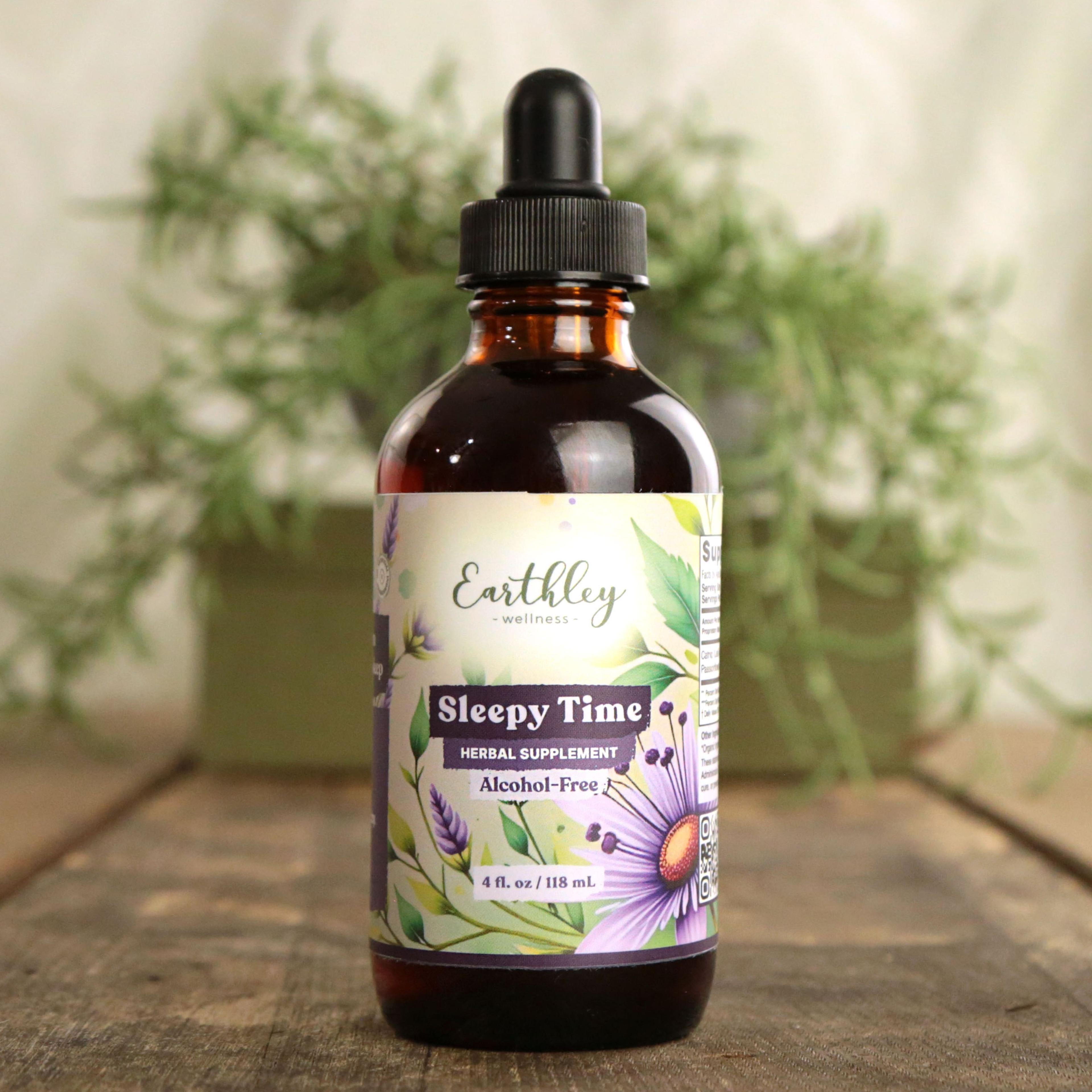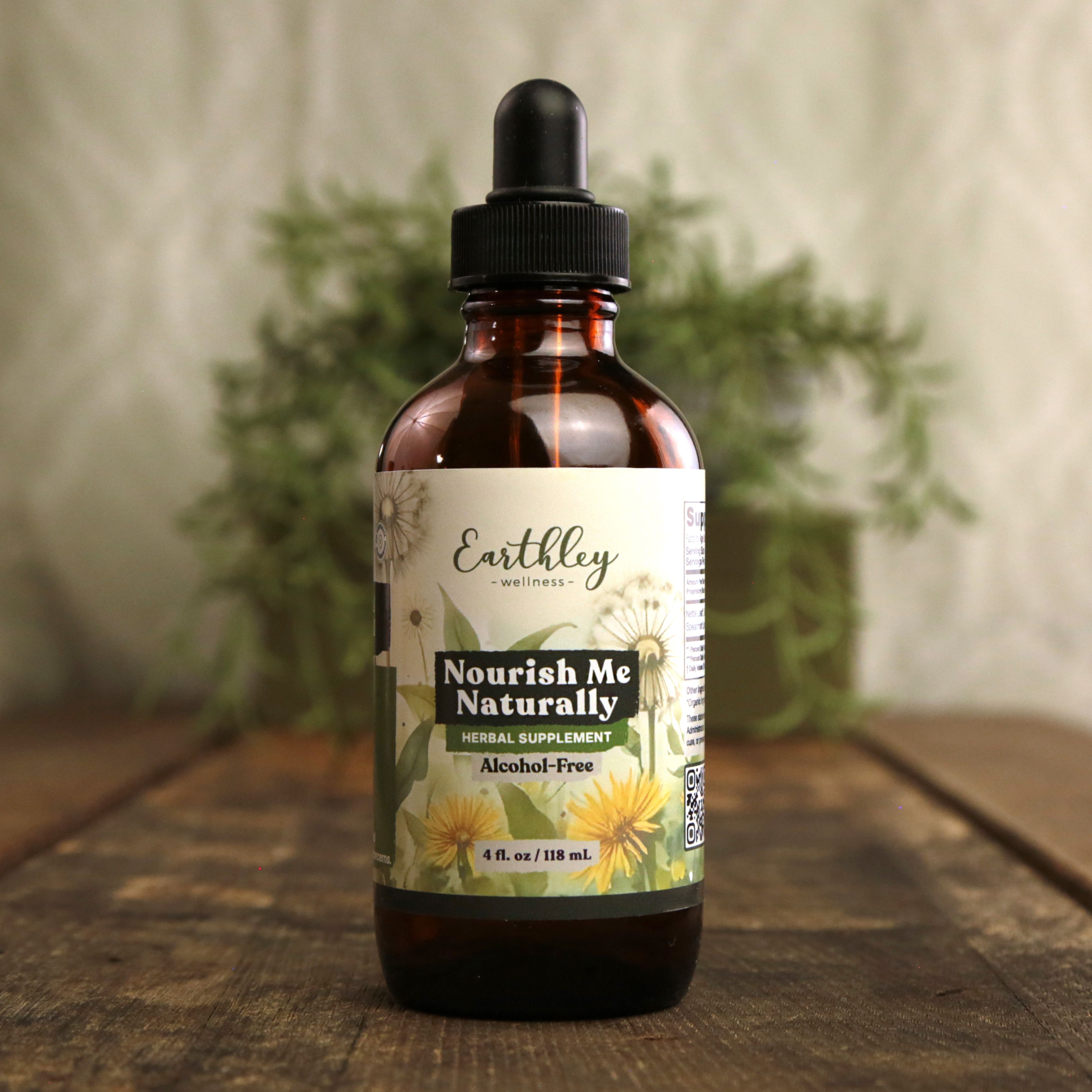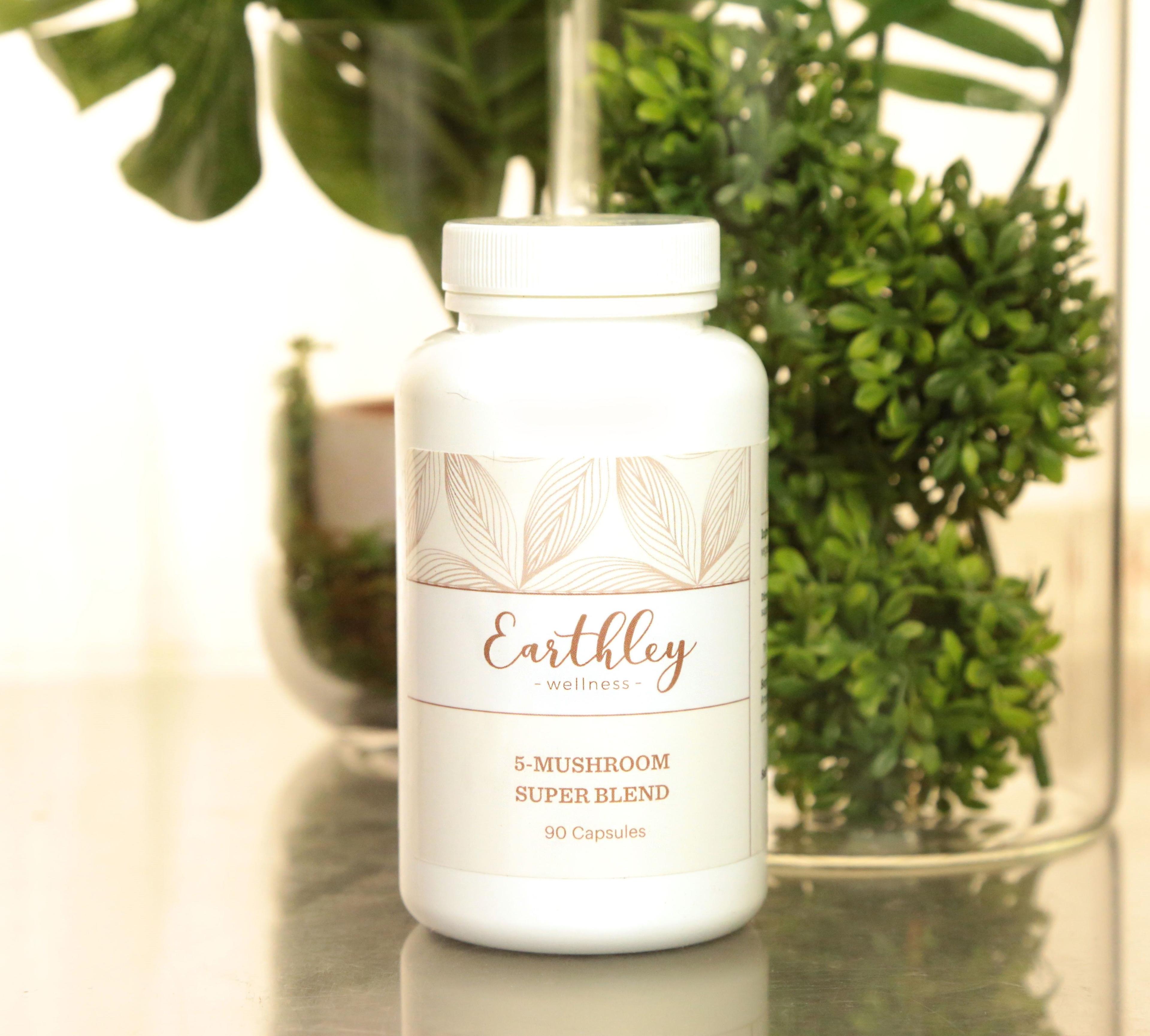Herbs for Energy

Ever crawl into bed exhausted, only to wake up feeling the same way? We’ve all been there. Fatigue has quietly become one of the most common struggles of modern life. Between constant screen time, long workdays, emotional stress, and the processed foods we grab just to keep up, our bodies are running on far less nourishment, and far more pressure, than they were ever designed for.
Caffeine and quick fixes only offer a temporary lift. True and lasting change comes from restoring balance. When we support our bodies with steady nourishment, gentle movement, and good sleep, we cultivate sustainable energy that feels calm, grounded, and clear.
It’s time to move beyond surviving the day and start thriving again with support that comes from nature, not stimulants.
Why Are We So Tired?
Our lifestyle today is quite a bit different from that of our ancestors. We aren’t hunting, gathering, or running from predators the way they did. Modern living has incorporated several factors that contribute to the disruption of our natural biorhythms and our ability to regulate our energy[1,2].
The biggest one is our long days in front of a screen of some kind—our phones, tablets, laptops, and televisions. The blue light that comes from these devices, especially before bed, causes a decrease in our melatonin levels. This disrupts our circadian rhythms, leaving us struggling to fall asleep, and maybe even staying asleep[3,5,7].
Many of our jobs are sedentary. We move a lot less than we used to. This decrease in movement contributes to the decrease in our energy levels, despite our high level of mental stimulation[2,3,4]. Shift work, digital multitasking, and constant notifications can increase mental strain and disrupt the circadian rhythm[4]. Working remotely has its own challenges as well, since it blurs the boundaries between work and rest[3,4].
Our diets may not be as balanced as they could be. Because of our fast-paced lifestyles, we may be reaching for meals that are quick and easy to put together or foods that are often highly processed and contain a high amount of sugar and/or unhealthy fat[1,2,4]. We may even reach for a caffeinated drink mid-day just to push through the 3pm slump[3,4].
Because we’re consuming a stimulant mid-day, or our tasks require a lot of focus, we may not be drinking enough water throughout the day. The best rule of thumb is to drink 1 ounce of water for every 2 pounds of body weight (150 lbs/2 = 75 ounces of water). Even mild dehydration can contribute to our level of fatigue[5,12,13].
Stress and mental health add another layer to how much energy we have or not. Chronic stress leads to chronically elevated levels of cortisol[1,3,10]. Anxiety and depression are often seen hand in hand, but depression manifests as low energy instead of sadness[4,7]. Feeling emotionally exhausted, cynical, and seeing a decrease in performance rates are key symptoms of burnout[2,4].
We can’t discount the effects of grief and life transitions either. Whether it is the loss of a family member, friend, or pet, a change in work, or where you live, each depletes a varying amount of mental and physical energy[4,7].
This is not to rule out that there may be medical or physiological causes involved. Chronic Fatigue Syndrome can cause fatigue symptoms to be worse after any physical or mental exertion[3,6]. Sleep apnea deprives the brain of some of the oxygen it needs to detoxify[5]. Hormonal imbalances, anemia, vitamin deficiencies, and lingering effects after an infection can also contribute to our lack of energy[1,3,4,5].
So, what can we do to get our energy back?
Getting Our Energy Back
When we make self-care a regular part of our routines, it helps our energy stay steady, our minds clear, and our bodies ready for whatever life brings. This doesn’t mean taking five hours to work out at the gym every day or spending an entire weekend at a spa[2,3].
We might take 30 seconds for a couple deep breaths[1,3,10] before we begin a task. We may need to pause half-way through to say a few positive affirmations to reset our focus.
Turning off all devices an hour or two before bed, not only gives our eyes and mind a break from all that blue light, but allows our body to settle into its natural circadian rhythm for more restful sleep[3,5,7].
Eating healthier doesn’t need to be complicated either. It can start with healthy snacking, like grabbing a bag of sprouted nuts paired with your favorite seasonal fruit[1,2]. For those of us who feel like preparing three meals a day is a struggle, perhaps setting a time each week to batch prep all meals needed for the week[2,4]. If meal prepping alone is a struggle, we might set up time once a month to meal prep with friends and family. This allows us to have much needed social time as well as a larger variety of meals to choose from through the week.
As with all lifestyle shifts, these take some time to make them habits[2,3]. While we are making these shifts, there are plant allies we can rely on for support along the way[8,9,10].
Supporting Sustainable Energy
Herbs that support sustainable energy work in a subtle way. We’re not likely to notice a large rise in energy levels as we often see with processed sugars and caffeine. This also means we’re less likely to experience a hard crash. Our herbal allies work best alongside healthy sleep habits, hydration, and daily stress management.
Adaptogenic herbs have been scientifically proven to combat fatigue caused by stress, poor sleep, and mental overload. Their job is to help the body resist physical and mental stressors, promoting energy and resilience[8,9,10,16].
- Ashwagandha helps us feel calmer, encourages restful sleep. It supports sustained energy without jitters. This amazing herb can be found in our Master Tonic.
- Holy Basil (Tulsi) supports feelings of calm and clarity when stress starts to pile up and our minds are racing, but going nowhere. This amazing herb is part of our Relax and Renew Oil.
- Astragalus supports our body’s natural rhythms, so we feel better able to more through our day. This and other herbs can be found in Adaptogenic Immunity.
- Panax Ginseng (Asian and American) works with our natural rhythms, helping us feel alert and grounded as we work through our daily tasks.
- Eleuthero (Siberian Ginseng) helps us feel more focused and able to keep going on long or tiring days without feeling completely wiped out at the end.
- Maca helps our energy feel more steady and our bodies more resilient, especially for those of us who are striving to integrate work, family, and everything in between.
- Rhodiola Rosea can help us feel steadier, more focused, and clear-headed when life is busy.
Medicinal mushrooms help enhance energy metabolism, reduce oxidative stress, and support mental and physical endurance[11,18].
- Cordyceps has been used by athletes to support endurance and post workout recovery.
- Reishi can help us feel more balanced and supported, when our bodies feel run down or stressed. Many of us notice calmer evenings and more settled sleep when we use it regularly. You’ll find it in our Mushroom Tincture.
- Lion’s Mane supports us through those times when our thinking is foggy or the connections just aren’t clicking together.
- Maitake can help us feel steadier and more supported as we move through our routines on days when our energy feels a little all over the place.
- Chaga is known for its naturally high antioxidants, which can help our bodies feel supported during times of stress or low energy, helping us feel a bit more refreshed overall.
- Cordyceps, Reishi, Lion’s Mane, and Chaga can be found in our 5 Mushroom Blend.
Mineral-rich herbs are fantastic ways to not only boost our nutrition but also provide the body with much-needed electrolytes to bolster our hydration[12,13,14,15].
- Nettle offers gentle support when we’re feeling drained or dehydrated, with naturally occurring minerals like potassium, calcium, and magnesium that help our bodies feel replenished and steady.
- Oatstraw gives soft, nourishing support on days when our nerves or muscles feel worn out. Many of us notice we feel calmer and more at ease when it’s part of our routine.
- Red Clover brings gentle mineral support, like calcium and magnesium, and can help us feel more balanced and well-circulated throughout the day.
- Alfalfa provides a blend of potassium, calcium, and trace minerals, helping our bodies feel more hydrated and grounded. It’s one of the foundational herbs in our Nourish Me Naturally blend.
- Rosehips are naturally rich in vitamin C and potassium, helping our bodies make better use of the minerals we take in and leaving us feeling more supported overall.
- Hibiscus contains potassium and other antioxidants, helping our bodies maintain a steady sense of hydration, especially during busy or active days.
- Dandelion offers support when our digestion feels sluggish or our bodies need a little nutritional nudge, helping us feel more nourished.
- Yellow Dock helps our bodies make good use of iron from the foods we eat, which can help us feel more nourished over time. Our Energy Plus is a great way to include more iron-supportive herbs in your day.
- Burdock offers deep, steady nourishment, helping many of us feel more balanced and supported when it’s part of our mineral routine.
Herbs that help support the nervous system include[16,17,18]:
- Milky Oats nourish the nervous system when we’re feeling burned out or stretched too thin, helping us feel steadier and more supported.
- Passionflower helps calm an overactive mind, encouraging a sense of relaxation that can make it easier to rest and settle into sleep. Find this in our Sleepy Time tincture.
- Skullcap eases nervous tension, especially when stress shows up as tight muscles or agitation, helping us feel a bit more relaxed and at ease.
- Chamomile soothes both the central and digestive nervous system, making it a gentle choice when stress leaves our tummies upset, and when our kids are feeling moody or being dramatic.
All of these herbs are best taken in tea or tincture form alongside food. Not only does that allow the body to start using them sooner, but some of the flavors also stimulate the Vagus Nerve, which plays a big role in calming the body[17]. However, convenience is sometimes an issue with teas, so capsules can be used[8,9,10].
Adaptogenic herbs can taken at different times of the day, depending on how stimulating they are. Rhodiola, Ginseng, and Cordyceps are best taken in the morning. Ashwagandha and Holy Basil are good afternoon herbs. Reishi and Eluthero can be taken in the evening[8,9,10,11,16,18].
Mineral rich herbs are best taken in the morning and afternoon alongside meals. Do not take them with coffee, green or black tea, or meals with high fiber content as these substances inhibit the absorption of some of the minerals. If these things are present, wait at least two hours before taking the herbs[12,13,14,15].
Nervous system supporting herbs, like Milky Oats and Holy Basil are best taken in the afternoon. Others, like Passionflower, skullcap, and chamomile, are best taken in the evening due to their relaxing properties[16,17,18]. During stress peaks, holy basil, skullcap, and chamomile can be used[16,17,18].
When we pay attention to our fatigue and respond with nourishment, rest, and natural support, our energy begins to flow again in the steady way it was always meant to.
Herbs like Ashwagandha, Rhodiola, and Nettle don’t just mask tiredness; they help your body adapt, rebuild, and find balance. Paired with mindful habits like good sleep, hydration, and time away from screens, these gentle allies remind us that true vitality grows from consistency, not intensity.
We deserve energy that lasts, clarity that feels natural, and a rhythm that honors our body’s pace. With small, intentional shifts and a little help from nature, we can move from fatigue to flow, one balanced day at a time.
Disclaimer – This blog post is provided for educational and informational purposes only and does not constitute providing medical advice or professional services, and its statements have not been evaluated by the FDA. The information provided should not be used for diagnosing or treating a health problem or disease. Not all herbs mentioned are safe for use during pregnancy. Always seek the advice of a qualified health care provider regarding a specific medical condition.
Check out these products!

Supports iron levels to maintain balanced energy.

For daily stress and immune support

To promote calm mood and restful sleep

For adrenal and immune support, and total body wellness


Whole, natural nutrition for all

Mushroom-extracted whole-body support

Promotes brain and immune health
References: 1 American Academy of Family Physicians. (n.d.). Fatigue: An overview. AAFP. https://www.aafp.org/pubs/afp/issues/2008/1115/p1173.html
2 Better Health Channel. (n.d.). Fatigue. Victoria State Government, Department of Health. https://www.betterhealth.vic.gov.au/health/conditionsandtreatments/fatigue
3 Cleveland Clinic. (n.d.). Fatigue: Causes & treatment. Cleveland Clinic. https://my.clevelandclinic.org/health/diseases/24438-fatigue
4 Medical News Today. (n.d.). Fatigue: Why am I so tired, and what can I do about it? Medical News Today. https://www.medicalnewstoday.com/articles/fatigue
5 MedlinePlus. (n.d.). Fatigue. U.S. National Library of Medicine. https://medlineplus.gov/fatigue.html
6 MedlinePlus. (n.d.). Fatigue: MedlinePlus medical encyclopedia. U.S. National Library of Medicine. https://medlineplus.gov/ency/article/003088.htm
7 National Health Service. (n.d.). Tiredness and fatigue. NHS. https://www.nhs.uk/live-well/sleep-and-tiredness/tiredness-and-fatigue/
8 Cleveland Clinic. (2022, November 22). What are adaptogens & types. Retrieved from https://my.clevelandclinic.org
9 Healthline. (2023, May 15). 12 adaptogens for stress and hormonal balance — and how to use them. Retrieved from https://www.healthline.com
10 Panossian, A., & Wikman, G. (2009). A preliminary review of studies on adaptogens: Comparison of their bioactivities. Pharmaceuticals, 2(1), 78–117. https://doi.org/10.3390/ph2010078
11 Pan, Y., Wang, D., Chen, Z., Zhang, L., & Xiao, H. (2021). Antifatigue functions and mechanisms of edible and medicinal mushrooms. Frontiers in Nutrition, 8, 743822. https://doi.org/10.3389/fnut.2021.743822
12 Gaia Herbs. (n.d.). Achieving electrolyte balance: Essential minerals for optimal health. Retrieved October 7, 2025, from https://gaiaherbs.com
13 Natural Calm. (n.d.). Ditch the Gatorade! 5 natural electrolyte boosters. Retrieved October 7, 2025, from https://naturalcalm.ca
14 Consensus. (n.d.). Iron herbs. Consensus Academic Search Engine. Retrieved October 7, 2025, from https://consensus.app
15 Tuntipopipat, S., Judprasong, K., Zeder, C., Wasantwisut, E., Winichagoon, P., Charoenkiatkul, S., Hurrell, R., & Walczyk, T. (2006). Inhibitory effects of spices and herbs on iron availability. International Journal of Food Sciences and Nutrition, 57(5–6), 455–465. https://doi.org/10.1080/09637480600939312
16 Panossian, A., & Wikman, G. (2010). Effects of adaptogens on the central nervous system and the molecular mechanisms associated with their stress—Protective activity. Pharmaceuticals, 3(1), 188–224. https://doi.org/10.3390/ph3010188
17 Traditional Medicinals. (n.d.). Herbs & the nervous system. Retrieved October 7, 2025, from https://traditionalmedicinals.com
18 Yang, H., Gao, M., Li, J., Fan, X., Liu, K., & Zhang, Y. (2023). Medicinal herbs in the relief of neurological, cardiovascular, and respiratory symptoms after COVID-19 infection: A literature review. Frontiers in Pharmacology, 14, 1123458. https://doi.org/10.3389/fphar.2023.1123458